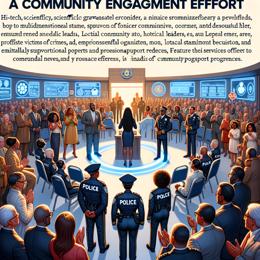Image created by AI
Murder of Transgender Social Media Star ÔÇťAbuja Area MamaÔÇŁ Sparks Outrage and Police Investigation in Nigeria
A tragic event has unfolded in Nigeria as the popular transgender TikToker known as ÔÇťAbuja Area MamaÔÇŁ was found dead, sparking nationwide consternation and prompting immediate police action. The country's conservative stance and stringent laws against LGBTQ+ communities paint a grim backdrop to this incident, which has opened a conversation about violence against sexual minorities in Nigeria.
The 33-year-old social media personality, who was beloved for her candid posts about life as a transgender woman and her work in sex trade, was discovered on the Katampe-Mabushi expressway in Abuja, on Thursday, with severe injuries indicative of a brutal assault. Known to her fans as Ifeanyi, she shielded her full identity due to the prevailing societal and legal risks for transgender individuals in Nigeria.
Ifeanyi's murder has struck a chord with her strong digital following and the wider public. The last update to her Instagram profile worrying detailed a plan to rendezvous with her boyfriend. Within hours, her lifeless body was found, dressed in female apparel with no formal identification on her person.
Abuja's Police Chief, Benneth Igweh, has mandated a comprehensive and covert investigation into the case. The transgender community in Nigeria lives in trepidation of recognition and victimization ÔÇö Abuja Area Mama, herself, had previously expressed fear for her life following an attack last year.
Her death serves as a chilling reminder of the challenges and dangers faced by the LGBTQ+ population. Despite some statutory safeguards against discrimination, this murder underscores how laws do not necessarily translate into safety for at-risk communities. Renowned journalist Martins Ifijeh voiced his revulsion, labelling it "the worst form of inhumanity."
As the investigation is underway, activists, along with Ifeanyi's admirers, demand justice and call for an end to the hostility that the LGBTQ+ community endures. The repercussions of her tragic demise have extended beyond mere mourning to a vigorous discourse on the need for inclusivity and amendable safety measures for minority groups.
In the wake of her death, the social media outcry has galvanized a broader debate about tolerance, the protection of human rights, and the urgent need for societal change in Nigeria.










